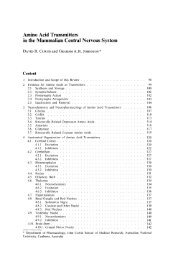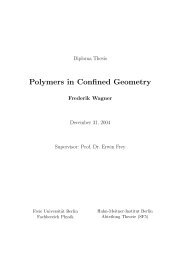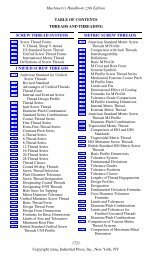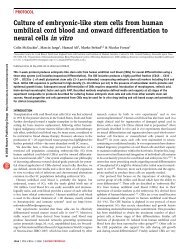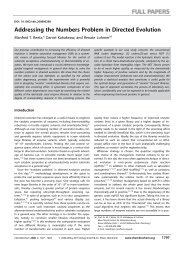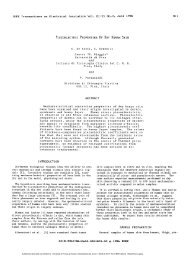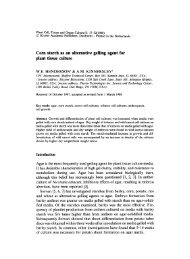- Page 2 and 3:
LIQUID CULTURE SYSTEMS FOR IN VITRO
- Page 4 and 5:
A C.I.P. Catalogue record for this
- Page 6 and 7:
Contents Contributing Authors xiii
- Page 8 and 9:
Liquid culture systems for in vitro
- Page 10 and 11:
Liquid culture systems for in vitro
- Page 12 and 13:
Contributing Authors Adelberg, J. 4
- Page 14 and 15:
Liquid culture systems for in vitro
- Page 16 and 17:
Preface Plant cell, tissue and orga
- Page 18 and 19:
Chapter 1 General introduction: a p
- Page 20 and 21:
General introduction 3 2. Cell susp
- Page 22 and 23:
General introduction 5 rooted in gr
- Page 24 and 25:
General introduction 7 (Winkelmann
- Page 26 and 27:
General introduction 9 the bioreact
- Page 28 and 29:
General introduction 11 (TIS), resu
- Page 30 and 31:
General introduction 13 Barz W, Rei
- Page 32 and 33:
General introduction 15 Hohe A, Win
- Page 34 and 35:
General introduction 17 Shimazu T &
- Page 36 and 37:
I. Bioreactors
- Page 38 and 39:
22 Wayne R. Curtis 1. Introduction
- Page 40 and 41:
24 Wayne R. Curtis headspace double
- Page 42 and 43:
26 Wayne R. Curtis that is required
- Page 44 and 45:
28 Wayne R. Curtis C L y � P O2
- Page 46 and 47:
30 Wayne R. Curtis since there is a
- Page 48 and 49:
32 Wayne R. Curtis 5 cm 30 cm 30 o
- Page 50 and 51:
34 Wayne R. Curtis Pˆ N � � me
- Page 52 and 53:
36 Wayne R. Curtis Radial Flow Impe
- Page 54 and 55:
38 Wayne R. Curtis CS = Medium diss
- Page 56 and 57:
40 Wayne R. Curtis Murashige T & Sk
- Page 58 and 59:
42 Anne Kathrine Hvoslef-Eide et al
- Page 60 and 61:
44 Anne Kathrine Hvoslef-Eide et al
- Page 62 and 63:
46 Anne Kathrine Hvoslef-Eide et al
- Page 64 and 65:
48 Anne Kathrine Hvoslef-Eide et al
- Page 66 and 67:
50 Anne Kathrine Hvoslef-Eide et al
- Page 68 and 69:
52 Anne Kathrine Hvoslef-Eide et al
- Page 70 and 71:
54 Anne Kathrine Hvoslef-Eide et al
- Page 72 and 73:
56 Anne Kathrine Hvoslef-Eide et al
- Page 74 and 75:
58 Anne Kathrine Hvoslef-Eide et al
- Page 76 and 77:
Chapter 4 Practical aspects of bior
- Page 78 and 79:
Practical aspects of bioreactor app
- Page 80 and 81:
Practical aspects of bioreactor app
- Page 82 and 83:
Practical aspects of bioreactor app
- Page 84 and 85:
Practical aspects of bioreactor app
- Page 86 and 87:
Practical aspects of bioreactor app
- Page 88 and 89:
Practical aspects of bioreactor app
- Page 90 and 91:
Practical aspects of bioreactor app
- Page 92 and 93:
Practical aspects of bioreactor app
- Page 94 and 95:
Chapter 5 Simple bioreactors for ma
- Page 96 and 97:
Simple bioreactors for mass propaga
- Page 98 and 99:
Simple bioreactors for mass propaga
- Page 100 and 101:
Simple bioreactors for mass propaga
- Page 102 and 103:
Simple bioreactors for mass propaga
- Page 104 and 105:
Simple bioreactors for mass propaga
- Page 106 and 107:
Simple bioreactors for mass propaga
- Page 108 and 109:
Simple bioreactors for mass propaga
- Page 110 and 111:
96 K. Y. Paek et al. opportunity fo
- Page 112 and 113:
98 K. Y. Paek et al. disadvantages
- Page 114 and 115:
100 K. Y. Paek et al. 3.1 Dissolved
- Page 116 and 117:
102 K. Y. Paek et al. optimizing bi
- Page 118 and 119:
104 K. Y. Paek et al. cosmetics, wh
- Page 120 and 121:
106 K. Y. Paek et al. protocol, mor
- Page 122 and 123:
108 K. Y. Paek et al. use. In order
- Page 124 and 125:
110 K. Y. Paek et al. a b c d e f F
- Page 126 and 127:
112 K. Y. Paek et al. a b c d e f F
- Page 128 and 129:
114 K. Y. Paek et al. Escalona M, L
- Page 130 and 131:
116 K. Y. Paek et al. Son SH & Paek
- Page 132 and 133:
118 Seppo Sorvari et al. economical
- Page 134 and 135:
120 Seppo Sorvari et al. membrane w
- Page 136 and 137:
122 Seppo Sorvari et al. 3. Results
- Page 138 and 139:
124 Seppo Sorvari et al. D.O. 160 1
- Page 140 and 141:
Chapter 8 Cost-effective mass cloni
- Page 142 and 143:
Cost-effective mass cloning of plan
- Page 144 and 145:
Cost-effective mass cloning of plan
- Page 146 and 147:
Cost-effective mass cloning of plan
- Page 148 and 149:
Cost-effective mass cloning of plan
- Page 150 and 151:
Cost-effective mass cloning of plan
- Page 152 and 153:
Cost-effective mass cloning of plan
- Page 154 and 155:
Cost-effective mass cloning of plan
- Page 156 and 157:
144 Eun-Joo Hahn & Kee-Yoeup Paek 1
- Page 158 and 159:
146 Eun-Joo Hahn & Kee-Yoeup Paek F
- Page 160 and 161:
148 Eun-Joo Hahn & Kee-Yoeup Paek T
- Page 162 and 163:
150 Eun-Joo Hahn & Kee-Yoeup Paek 3
- Page 164 and 165:
152 Eun-Joo Hahn & Kee-Yoeup Paek E
- Page 166 and 167:
Chapter 10 Control of growth and di
- Page 168 and 169:
Control of growth and differentiati
- Page 170 and 171:
Control of growth and differentiati
- Page 172 and 173:
Control of growth and differentiati
- Page 174 and 175:
Chapter 11 Temporary immersion syst
- Page 176 and 177:
Temporary immersion system: a new c
- Page 178 and 179:
Temporary immersion system: a new c
- Page 180 and 181:
Temporary immersion system: a new c
- Page 182 and 183:
Temporary immersion system: a new c
- Page 184 and 185:
Temporary immersion system: a new c
- Page 186 and 187:
Temporary immersion system: a new c
- Page 188 and 189:
Temporary immersion system: a new c
- Page 190 and 191:
Temporary immersion system: a new c
- Page 192 and 193:
Temporary immersion system: a new c
- Page 194 and 195:
Temporary immersion system: a new c
- Page 196 and 197:
Temporary immersion system: a new c
- Page 198 and 199:
Temporary immersion system: a new c
- Page 200 and 201:
Temporary immersion system: a new c
- Page 202 and 203:
Temporary immersion system: a new c
- Page 204 and 205:
Temporary immersion system: a new c
- Page 206 and 207:
198 Elio Jiménez González 1. Intr
- Page 208 and 209:
200 Elio Jiménez González Several
- Page 210 and 211:
202 Elio Jiménez González Figure
- Page 212 and 213:
204 Elio Jiménez González exploit
- Page 214 and 215:
206 Elio Jiménez González weeks i
- Page 216 and 217:
208 Elio Jiménez González germina
- Page 218 and 219:
210 Elio Jiménez González Escalan
- Page 220 and 221:
Chapter 13 Use of growth retardants
- Page 222 and 223:
Use of growth retardants for banana
- Page 224 and 225:
Use of growth retardants for banana
- Page 226 and 227:
Use of growth retardants for banana
- Page 228 and 229:
Use of growth retardants for banana
- Page 230 and 231:
Use of growth retardants for banana
- Page 232 and 233:
Chapter 14 Somatic embryo germinati
- Page 234 and 235:
Somatic embryo germination of Psidi
- Page 236 and 237:
Somatic embryo germination of Psidi
- Page 238 and 239:
232 Tino Hempfling & Walter Preil N
- Page 240 and 241:
234 Tino Hempfling & Walter Preil 3
- Page 242 and 243:
236 Tino Hempfling & Walter Preil F
- Page 244 and 245:
238 Tino Hempfling & Walter Preil F
- Page 246 and 247:
240 Tino Hempfling & Walter Preil 4
- Page 248 and 249:
242 Tino Hempfling & Walter Preil R
- Page 250 and 251:
244 C. Damiano et al. Over the last
- Page 252 and 253:
246 C. Damiano et al. 2.2 Temporary
- Page 254 and 255:
248 C. Damiano et al. Table 3: Wate
- Page 256 and 257:
250 C. Damiano et al. hyperhydricit
- Page 258 and 259:
Chapter 17 Optimisation of growing
- Page 260 and 261:
Optimisation of growing conditions
- Page 262 and 263:
Optimisation of growing conditions
- Page 264 and 265:
Optimisation of growing conditions
- Page 266 and 267:
Optimisation of growing conditions
- Page 268 and 269:
264 Katerina Grigoriadou et al. cul
- Page 270 and 271:
266 Katerina Grigoriadou et al. 2.4
- Page 272 and 273:
268 Katerina Grigoriadou et al. mic
- Page 274 and 275:
270 Katerina Grigoriadou et al. of
- Page 276 and 277:
272 Katerina Grigoriadou et al. 4.
- Page 278 and 279:
274 Katerina Grigoriadou et al. Tei
- Page 280 and 281:
276 Ch. Wawrosch et al. possesses s
- Page 282 and 283:
278 Ch. Wawrosch et al. 3. Results
- Page 284 and 285:
280 Ch. Wawrosch et al. References
- Page 286 and 287:
Chapter 20 Propagation of Norway sp
- Page 288 and 289:
Propagation of Norway Spruce 285 2.
- Page 290 and 291:
Propagation of Norway Spruce 287 su
- Page 292 and 293:
Propagation of Norway Spruce 289 5.
- Page 294 and 295:
Propagation of Norway Spruce 291 bl
- Page 296 and 297:
Propagation of Norway Spruce 293 H
- Page 298 and 299:
296 M. Vágner et al. 1995). In liq
- Page 300 and 301:
298 M. Vágner et al. maturation pe
- Page 302 and 303:
300 M. Vágner et al. mature somati
- Page 304 and 305:
302 M. Vágner et al. Acknowledgeme
- Page 306 and 307:
304 Christopher Hunter & Lionel Lev
- Page 308 and 309:
306 Christopher Hunter & Lionel Lev
- Page 310 and 311:
308 Christopher Hunter & Lionel Lev
- Page 312 and 313:
310 Christopher Hunter & Lionel Lev
- Page 314 and 315:
312 Christopher Hunter & Lionel Lev
- Page 316 and 317:
314 Michel Petitprez et al. 1. Intr
- Page 318 and 319:
316 Michel Petitprez et al. 2.2 QTL
- Page 320 and 321:
318 Michel Petitprez et al. Figure
- Page 322 and 323:
320 Michel Petitprez et al. Table 1
- Page 324 and 325:
322 Michel Petitprez et al. Gentzbi
- Page 326 and 327:
324 F. Afreen et al. 1. Introductio
- Page 328 and 329:
326 F. Afreen et al. precotyledonar
- Page 330 and 331:
328 F. Afreen et al. Dry mass (mg/e
- Page 332 and 333:
330 F. Afreen et al. under photoaut
- Page 334 and 335:
332 F. Afreen et al. Figure 3: a) C
- Page 336 and 337:
334 F. Afreen et al. the plant qual
- Page 338 and 339: Chapter 25 Potential of flow cytome
- Page 340 and 341: Potential of flow cytometry 339 dis
- Page 342 and 343: Potential of flow cytometry 341 Fig
- Page 344 and 345: Potential of flow cytometry 343 tha
- Page 346 and 347: Chapter 26 Somatic embryogenesis of
- Page 348 and 349: Somatic embryogenesis of Gentiana 3
- Page 350 and 351: Somatic embryogenesis of Gentiana 3
- Page 352 and 353: Somatic embryogenesis of Gentiana 3
- Page 354 and 355: Somatic embryogenesis of Gentiana 3
- Page 356 and 357: Somatic embryogenesis of Gentiana 3
- Page 358 and 359: Somatic embryogenesis of Gentiana 3
- Page 360 and 361: Chapter 27 Induction and growth of
- Page 362 and 363: Induction and growth of tulip 361 a
- Page 364 and 365: Induction and growth of tulip 363 T
- Page 366 and 367: Chapter 28 Micropropagation of Ixia
- Page 368 and 369: Micropropagation of Ixia 367 for PA
- Page 370 and 371: Micropropagation of Ixia 369 Biomas
- Page 372 and 373: Micropropagation of Ixia 371 Figure
- Page 374 and 375: Chapter 29 Micropropagation of Rosa
- Page 376 and 377: Micropropagation of Rosa 375 The BA
- Page 378 and 379: Micropropagation of Rosa 377 Platfo
- Page 380 and 381: Micropropagation of Rosa 379 3. Res
- Page 382 and 383: Micropropagation of Rosa 381 The ro
- Page 384 and 385: Micropropagation of Rosa 383 4. Dis
- Page 386 and 387: Micropropagation of Rosa 385 Murash
- Page 390 and 391: Mass propagation of conifer trees 3
- Page 392 and 393: Mass propagation of conifer trees 3
- Page 394 and 395: Mass propagation of conifer trees 3
- Page 396 and 397: Mass propagation of conifer trees 3
- Page 398 and 399: Mass propagation of conifer trees 3
- Page 400 and 401: Mass propagation of conifer trees 4
- Page 402 and 403: Chapter 31 Potentials for cost redu
- Page 404 and 405: Potentials for cost reduction 405 c
- Page 406 and 407: Potentials for cost reduction 407 c
- Page 408 and 409: Potentials for cost reduction 409 s
- Page 410 and 411: Potentials for cost reduction 411 N
- Page 412 and 413: Potentials for cost reduction 413 G
- Page 414 and 415: Chapter 32 A new approach for autom
- Page 416 and 417: A new approach for automation 417 (
- Page 418 and 419: A new approach for automation 419 p
- Page 420 and 421: A new approach for automation 421 T
- Page 422 and 423: A new approach for automation 423 D
- Page 424 and 425: 426 B. McAlister et al. 1. Introduc
- Page 426 and 427: 428 B. McAlister et al. 2.2 Multipl
- Page 428 and 429: 430 B. McAlister et al. Table 2: Mu
- Page 430 and 431: 432 B. McAlister et al. rest time -
- Page 432 and 433: 434 B. McAlister et al. Figure 3: M
- Page 434 and 435: 436 B. McAlister et al. Average mul
- Page 436 and 437: 438 B. McAlister et al. Table 4: Co
- Page 438 and 439:
440 B. McAlister et al. Semi-solid
- Page 440 and 441:
442 B. McAlister et al. Escalona M,
- Page 442 and 443:
444 Jeffrey Adelberg including Host
- Page 444 and 445:
446 Jeffrey Adelberg BioSystems (Ho
- Page 446 and 447:
448 Jeffrey Adelberg more prolific
- Page 448 and 449:
450 Jeffrey Adelberg vessel of liqu
- Page 450 and 451:
452 Jeffrey Adelberg Figure 4: Labo
- Page 452 and 453:
454 Jeffrey Adelberg constituted a
- Page 454 and 455:
456 Jeffrey Adelberg Acknowledgemen
- Page 456 and 457:
Chapter 35 Aeration stress in plant
- Page 458 and 459:
Aeration stress in plant tissue cul
- Page 460 and 461:
Aeration stress in plant tissue cul
- Page 462 and 463:
Aeration stress in plant tissue cul
- Page 464 and 465:
Aeration stress in plant tissue cul
- Page 466 and 467:
Aeration stress in plant tissue cul
- Page 468 and 469:
Aeration stress in plant tissue cul
- Page 470 and 471:
Aeration stress in plant tissue cul
- Page 472 and 473:
476 Hans R. Gislerød et al. 1. Int
- Page 474 and 475:
478 Hans R. Gislerød et al. biorea
- Page 476 and 477:
480 Hans R. Gislerød et al. A low
- Page 478 and 479:
482 Hans R. Gislerød et al. Table
- Page 480 and 481:
484 Hans R. Gislerød et al. common
- Page 482 and 483:
486 Hans R. Gislerød et al. can be
- Page 484 and 485:
488 Hans R. Gislerød et al. 4.1 Li
- Page 486 and 487:
490 Hans R. Gislerød et al. 4.3 Ca
- Page 488 and 489:
492 Hans R. Gislerød et al. Morten
- Page 490 and 491:
494 Han Bouman & Annemiek Tiekstra
- Page 492 and 493:
496 Han Bouman & Annemiek Tiekstra
- Page 494 and 495:
498 Han Bouman & Annemiek Tiekstra
- Page 496 and 497:
500 Han Bouman & Annemiek Tiekstra
- Page 498 and 499:
502 Han Bouman & Annemiek Tiekstra
- Page 500 and 501:
504 Han Bouman & Annemiek Tiekstra
- Page 502 and 503:
V. Biomass for Secondary Metabolite
- Page 504 and 505:
510 E. Gontier et al. 1. Introducti
- Page 506 and 507:
512 E. Gontier et al. 2. Materials
- Page 508 and 509:
514 E. Gontier et al. developed dra
- Page 510 and 511:
516 E. Gontier et al. 3.3 Establish
- Page 512 and 513:
518 E. Gontier et al. Fresh weight
- Page 514 and 515:
520 E. Gontier et al. 3.5 Effect of
- Page 516 and 517:
522 E. Gontier et al. 3.6 Scale up
- Page 518 and 519:
524 E. Gontier et al. Lorenzo JC, G
- Page 520 and 521:
526 Dirk Wilken et al. 1. Introduct
- Page 522 and 523:
528 Dirk Wilken et al. running at 6
- Page 524 and 525:
530 Dirk Wilken et al. described a
- Page 526 and 527:
532 Dirk Wilken et al. packed cell
- Page 528 and 529:
534 Dirk Wilken et al. bioactive co
- Page 530 and 531:
536 Dirk Wilken et al. Fowler MW (1
- Page 532 and 533:
Chapter 40 Cultivation of root cult
- Page 534 and 535:
Cultivation of root cultures of Pan
- Page 536 and 537:
Cultivation of root cultures of Pan
- Page 538 and 539:
Cultivation of root cultures of Pan
- Page 540 and 541:
Chapter 41 Optimisation of Panax gi
- Page 542 and 543:
Optimisation of Panax ginseng liqui
- Page 544 and 545:
Optimisation of Panax ginseng liqui
- Page 546 and 547:
Optimisation of Panax ginseng liqui
- Page 548 and 549:
Optimisation of Panax ginseng liqui
- Page 550 and 551:
558 S. M. Nalawade et al. performan
- Page 552 and 553:
560 S. M. Nalawade et al. Plantlets
- Page 554 and 555:
562 S. M. Nalawade et al. leaves on
- Page 556 and 557:
564 S. M. Nalawade et al. roots (Fi
- Page 558 and 559:
Chapter 43 Production of taxanes in
- Page 560 and 561:
Production of taxanes 569 2. Materi
- Page 562 and 563:
Production of taxanes 571 Figure 2:
- Page 564 and 565:
Production of taxanes 573 various T
- Page 566 and 567:
Acknowledgments The editors thank t
- Page 568 and 569:
578 Contents 130, 131, 133, 134, 13
- Page 570 and 571:
580 Contents poplar, see Populus Po
- Page 572 and 573:
582 Contents bubble aerated 165 bub
- Page 574 and 575:
584 Contents ginsenoside content, p
- Page 576 and 577:
586 Contents plant growth regulator
- Page 578:
588 Contents -free microcorms 71 -f



